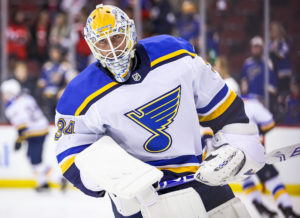For any kid who grows up wanting to be a goaltender, their ultimate goal is to be the team’s starter. They wanted to be the one that makes that final save in Game 7 of the Stanley Cup Final.
Related: Scotty Bowman – A Coach’s Life
I know one kid who played goaltender in our neighborhood and who probably at one point, had that dream as well. It didn’t hurt that somewhere during his youth, the future Hall of Famer Pat LaFontaine played with them, even though he was probably long gone before I ever made even one save. No doubt, Jake Allen was also one of those kids, growing up in Fredericton, New Brunswick.
In the Beginning
For the Blues, they’ve been looking for that same goaltender too. The one who could take them to Lord Stanley’s Cup, and while it took them over 50 years to find that goaltender, it turned out he was a goaltender that no one knew before the season started. Now mind you, they’ve had their fair share of talented goaltenders. Starting in the 1960s, future Hall of Famers Jacque Plante and Glenn Hall, were just two of many who have worn the blue note during their career.

Others included Mike Liut back in the 1980s, who was later traded for financial reasons during Harry Ornest’s time as owner of the Blues, Curtis Joseph in the 1990s, who until recently had the most career wins of any goaltender that had never won a Stanley Cup, and more recently, Ryan Miller, who was thought to be the final piece to the puzzle during the 2013-14 season.
Starting in Goal
Fast forward to the 2016-17 season, after Brian Elliott left to sign with the Calgary Flames, Allen officially became the starter while the role of backup continued to be a position in flux. First came Carter Hutton. After three years as the backup to Pekka Rinne with the Nashville Predators, Hutton was looking for a chance himself to become a starting a goaltender in the NHL. After his contract with the Blues was up in 2018, however, he decided to sign with the Buffalo Sabres.
The next goalie to be the backup was Chad Johnson, ironically enough, from Buffalo. He didn’t even last a season before being put on waivers. Meanwhile, the Blues also signed two other goaltenders, one named Ville Husso, who some believed was an up and coming star, and Jordan Binnington, who during this time, had been loaned out to the AHL’s Providence Bruins (ironically enough, a Boston Bruins affiliate) as they had no roster spot for him.
Related: Top 10 NHL Backup Goaltenders
While all this was going on, Allen was having problems of his own. In both the 2016-17 and 2017-18 seasons, he went through an unfortunate slump right around the time of the trading deadline and a month or so before the playoffs started.
Seasons of Change
By the beginning of the 2017-18 season, the Blues were also going through some coaching changes. Early into the season, the team decided to fire Ken Hitchcock after nearly four years and replace him with Mike Yeo. Unlike most coaching changes, however, Hitchcock talked about how that season was going to be his last and so Yeo was signed prior to the start of the season with the plan to replace Hitchcock after the season.

By the beginning of the 2018-19 season, the Blues once again had Allen as their starter, this time with Johnson as his backup, with both Husso and Binnington in the AHL with the San Antonio Rampage.
Stanley Cup Backup
Now the 2018-19 season itself started out as usual for the Blues, playing poor enough to warrant yet another coaching change with Craig Berube becoming the interim head coach after Yeo’s dismissal. By January, they had the worst record in hockey as Allen struggled. So, with Johnson gone via waivers and Husso hurt, the Blues called up Binnington in late December and by early January he was the starter. Eventually, he led them to be the first team in the NHL to go from last place in January to Stanley Cup champions by the end of the season.
As the Blues rode Binnington all the way to the Cup, however, Allen seemed to find a new role, as a backup goaltender. For Allen, he went on to finish the season at 19-17-8, going 5-4-4 following Binnington’s’ arrival. In addition, the one place where he played his best throughout the season was on the road. Ironically, this was also where the Blues played their best hockey. In fact, the Blues clinched the Cup in Game 7, on the road in Boston, only with Binnington in goal. Allen did, however, get the chance to play in one of the playoff games.
So this season, Allen seems to have found his groove back, as he is 12-6-3. He’s also had the chance to play, and even win, at home. He also helped Binnington learn to adjust to life and winning in the NHL last season, no doubt a difficult adjustment overlooked by man. I think Allen settled into the role of backup quite well. He was there to offer support and encouragement. To quote an old phrase, “there is no I in team,” and I think Allen proved that. He could have sulked but he didn’t. He did what was best for the team and ultimately, I think that proved beneficial. After all, he and the Blues are defending Stanley Cup champions.